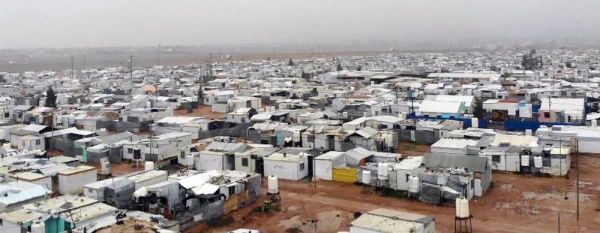Za'atari refugee camp in Syria. Photo source: Saudi Gazette
The Syrian tragedy, ignored by the news media, deepens by
the hour.
The government has almost doubled gasoline prices in a
month. Auto insurance rates are rising as much as 50%, reports The Syrian
Observer. This hits the pocketbooks of the most affluent and mobile, and
thus politically influential, part of the population. Protests are likely.
Sharp increases in food or fuel prices often trigger deadly riots, as they did
in Kazakhstan in full view of my apartment window in January 2022.
Like
other prices, those of gasoline are rising because the Syrian pound is going to
zero. In one year, the dollar value of the official Syrian pound dropped 81%, from 2513 pounds to the dollar to 13,000 in three or four days. If this trend continues, the exchange rate will rise to 1.9 million pounds per dollar in less than three weeks. That is, the pound will be worth 5/100,000 of a penny. Can you say "hyperinflation"? On the street, of
course, the depreciation would be even steeper.
These numbers are conjectural, because the economy will implode long before the three weeks are up. The central bank of Syria might have been able to sustain such a large one-time devaluation, had it dollars in reserve to back the pound. But it doesn't. Indeed, the wasting away of the pound is largely due, I think, to the bank's incompetence. A year or so ago, one might have blamed the scarcity of dollars on US government sanctions meant to stop dollar laundering. But Washington has lifted the sanctions for a few months, and yet the pound is dwindling faster than ever. The likely suspect is the bank in Damascus.
Most central banks, at least in the West, understand that they should tell it like it is, disclosing how much they hold in dollars and other foreign currency, known as “hard reserves.” This sustains public confidence in the long run. And it would behoove troubled central banks, too, if only to obtain emergency loans. But the central bank of Syria refuses to disclose anything. So people assume the worst—they assume it has no dollars—and pull their own out of the country, fulfilling their prophecy. The Syrians seem to have learned banking from Zimbabwe.
For hard reserves, Syria turns to Iran. Its other ally, Russia, is running out of dollars, too, thanks to Western sanctions against Putin’s War. Syria and Iran are jointly opening banks. Their growing political alliance will destabilize the Middle East.
Meanwhile, as its donations dwindle by two thirds over a year or two, the World Food Programme keeps cutting aid—by a third in two major refugee camps of Syria, Za'atari and Azraq, where the majority of the 119,000 survive, or did survive, on cash aid.
Reference
|

No comments:
Post a Comment